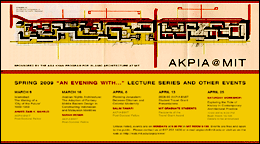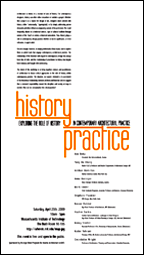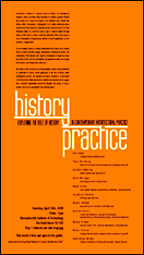Lectures, Conferences & Events» Past Lectures & Events
Ahmed Zaib Khan Mahsud
"Islamabad: The Making of a 'City of the Future' 1959-1963"
Abstract
Islamabad is one of the largest planned capital city projects of 20 th century yet a little-known and understudied episode in the history of modern architecture and urbanism. Making of its plan – the translation of various agendas (political, economic, social), urbanistic ideas and concepts into an operating pattern for materialization in a specific context – represents an ambitious illustration of the Greek architect / urbanist C. A. Doxiadis´ 'City of the Future' for unfolding a metropolis of 3 million inhabitants. Embedded in the plan's spatial articulation is a specific idea of urbanity – discernable from a more complex configuration of modernist vocabulary – that propounds the transformation of modernist ideas about the city. Such transformation is read as a certain reinvention / reformulation of modern urbanism.
Followed by a brief introduction to the context, making of the plan will be presented for its idea of urbanity with the lens of nature- state-citizen relationship by illustrating two key themes: the specific notion of monumentality as state representation, and nature-city integration as double scale development for enhancing the citizen's sense of well-being. Drawing on the analysis of wthe architectural value of the plan, its re-reading will be presented through key elements marking its departure from mainstream modernism.
Biography
Ahmed Zaib is an architect-urbanist and historian of modern urbanism. Prior to becoming AKPIA Postdoctoral fellow (Cambridge 2008-09), he graduated as an architect from NCA (Lahore 1990-95), practiced for 5 years (Islamabad 1995-00), and pursued postgraduate and PhD level research at K. U. Leuven (Belgium 2000-08).
Ahmed´s current research interests revolve around developing a historical and theoretical framework for issues of socio-spatial and environmental sustainability within the realm of Urban Design. The evolution of this focus has its intellectual basis in his PhD (2003-08) dissertation – aimed at critical analysis of the relationship between theory and practice – titled Constantinos A. Doxiadis´ Plan for Islamabad: The Making of a 'City of the Future' 1959-1963.
Earlier precedents that evolved Ahmed´s research focus includes an advance masters (2000-01) of architecture in Human Settlements followed by a graduate certificate in Environmental Impact Assessment (2003), which offered him a multi-disciplinary framework to look at the urbanization process at large and its relation to environment and sustainability issues. Whereas, the PhD on a figure like Doxiadis (1913-75) broadened his horizon to the modalities of the world of grand planning and spatial design of the post world war-II decades (1950s-60s) in the context of international development planning, and within that to the scope and potentialities of Urban Design as a specific focus.
Sarah Moser
“Arabian Nights Architecture: The Adoption of Fantasy Middle Eastern Design in Constructing Indonesian and Malaysian Identities”
Biography
Sarah received her MLA from the Faculty of Architecture, Landscape and Design at the University of Toronto and her Ph.D. in cultural geography from the National University of Singapore. Through many years of work, study, field research and travel in Asia, Sarah has gained fluency in the Malay and Indonesian languages and has developed a deep interest in how religious, national and political ideology shape the built environment in Southeast Asia.
As a recipient of a 2008-09 Aga Khan Postdoctoral Fellowship, Sarah will draw on her expertise on urban change and the construction of national identity in Malaysia and Indonesia. Her research at AKPIA examines the growing trend of cultural 'Islamicization' in two seats of political power in Indonesia and Malaysia, specifically focusing on the recent adoption of Middle Eastern forms for use in secular state buildings and urbanism. Her research also investigates the emerging transnational cultural linkages between the Middle East (or an imagined Middle East) and Muslim-dominated Southeast Asia while placing recent urban developments within a broader context of social, political and religious change in the region.
Sarah has published in several leading journals of geography, urban studies and Asian studies and is working on an edited collection on planned cities in the Muslim world.
Salim Tamari
"Planning Jerusalem: Between Ottoman and Colonial Modernity”
Biography
Director, Institute of Jerusalem Studies; Professor of Sociology at Birzeit University; Visiting Professor, University of California at Berkeley (2005, 2007, 2008); Eric Lane Fellow, Cambridge University, 2008; New York University 2001-2003; Cornell 1997; University of Paris at Jussieu (1993) U of Chicago 1991-92, University of Michigan 1987; Durham University (UK) 1984; PhD. Manchester University 1983; Editor Hawliyyat al Quds, and Jerusalem Quarterly. Author of several works on urban culture, political sociology, biography and social history, and the social history of the Eastern Mediterranean. Recent publications include: Jerusalem 1948 (2001) ; Ottoman Jerusalem (AlQuds Al Uthmaniyya) (2002) Mandate Jerusalem in the Memoirs of Wasif Jawahariyyeh (with Issam Nassar, 2005)[al Quds al Intidabiyyah fil Mudkharat al Jawhariyyah]; al Jabal didd al Bahar, Muwatin, 2005); Pilgrims, Lepers, and Stuffed Cabbage: Essays on the Cultural History of Ottoman and Mandate Jerusalem (editor) (IJS, 2005). Biography and Social History of Bilad al Sham (edited, with I. Nassar, 2007, BeirutIPS); The Mountain Against the Sea (University of California Press, 2008); Ihsan's War: The Intimate Life of an Ottoman Soldier (IPS, Beirut, 2008); Year of the Locust: Palestine and Syria during WWI (forthcoming UC Press, 200



